‘Role Mobutu Sese Seko played,’ How D.R. Congo commemorated 50th anniversary of the greatest sporting event of the 20th century in Africa watched by millions of viewers worldwide on October 30, 1974.
Judex Tshipanda, 71, sits on a wall outside this Kinshasa’s Tata Raphaël Stadium, recalling the day that has gone down as one of the most memorable in this central African country’s history.
On Oct. 30, 1974, Muhammad Ali fought heavyweight boxing champion George Foreman in an eight-round match — and emerged victorious after he knocked his opponent to the ground with a vicious uppercut.

Billed as the “Rumble in the Jungle,” and watched by millions of viewers worldwide at the time, the fight is regarded as one of the greatest sporting events of the 20th century.
Ex-Delta Deputy Governor, Amos Utuama, Dies At 77
Post-Election Violence Looms In US
EPL: How Newcastle Defeated Arsenal 1-0
But in the Democratic Republic of Congo, which was then known as Zaire, the match has taken on mythic proportions, and propelled a generation of youngsters to take up boxing.
Tshipanda was a serious boxer at age 21, when Muhammad Ali touched down in his hometown of Kinshasa ahead of the fight. The U.S. athlete would come to his boxing club to spar, and Tshipanda and other “fanatics” would jog alongside Ali’s jeep when he returned home.

“It inspired all of Congo,” said Tshipanda, who subsequently founded a boxing club inside Tata Raphaël Stadium, called La Tête Haute de Muhammad Ali, meaning “Muhammad Ali’s head held high.”
UK Conservative Party Elects Kemi Badenoch New Leader
African Atlantic Gas Pipeline: Regional Cooperation Key To Unlocking Energy Security – Ekpo
Sahara Group Foundation Launches MADAA, Drives Home-grown Innovation In Africa
The Tata Raphaël Stadium, whose outside walls are covered in multicolored murals inspired by African art, has since fallen into disrepair, a victim of the poverty and mismanagement that plagues Congo, also known as DRC.
Former dictator Mobutu Sese Seko played a key role in bringing the Ali-Foreman fight to Kinshasa, viewing the event as a way to put his country on the map, just 14 years after it gained independence from the former colonial power Belgium.

Rebels eventually forced Mobutu from power in 1997 after decades of brutal and corrupt rule, sparking a series of wars that played out in Congo until 2003, and which historians estimate killed between 1 million and 3 million people.
Ruben Amorim Named Manchester United Head Coach
Again, Security Operatives Foil Bobrisky’s Escape Bid, Eject Him From Amsterdam-Bound Flight
The country has never fully recovered. Militia conflict endures in the mineral-rich east, and Congo also remains one of the poorest and most corrupt countries in the world.
For many people in the central African country, the figure of Ali, as well as the fight that took place 50 years ago, remain symbols of a better time. Congo’s sports minister stated on social media on Wednesday — the day of the anniversary — that the event inspired “constant enthusiasm and unshakeable pride.”

It also recalled a time when Congo’s soft power “commanded respect throughout the world.” A planned commemoration of the rumble’s 50th anniversary, organized by the government, barely came together in time. On the night, about 100 people turned up to watch young Congolese boxers face off in a ring erected inside the Tata Raphaël Stadium complex, but on a concrete expanse outside the official stands.
‘Advanced, Efficient’ EKEDC Begins Standard Transfer Specification 2.0 Meter Upgrade
PHOTONEWS: Adeola Yusuf Bags Journalism Entrepreneur of The Year Award
‘No Plane? No Problem,’ 5 Countries Without Airport And How To Reach Them
Still, many of the country’s boxing greats came to pay their respects, including members of the national boxing squad, and the heads of the boxing federation.
Twenty-four-year-old Landry Matete, who goes by the alias Balo, was quietly watching the matches from the front row. The national boxing champion, and silver-medal winner in this year’s African Amateur Boxing Championships, said that the Rumble in the Jungle — although it took place long before he was born — had inspired him to get into the sport.
“It’s like the foundation of a house, it represents a lot for us,” said Balo, adding that the event had marked the history of the country indelibly.
“Congo is a country of boxing,” he said, but he explained that the lack of opportunity meant that a lot of sporting talent goes to waste. “Those who have opportunity always shine,” he said.
To this day, Congo still produces outstanding boxers. Congolese native Martin Bakole ranks as the World Boxing Association’s No. 1 heavyweight.
Revoke Airstrip Licence Granted to Oyedepo, Others, Reps Order Aviation Ministry
‘1st Time In Africa,’ Davido Breaks Record On TikTok
How Veteran Nollywood Actor, Charles Olumo ‘Agbako’, Died
Judex Tshipanda, who also attended the commemoration, credited the Rumble of the Jungle as the reason Congo has consistently produced boxing talent since 1974.
He can still give a detailed account of each round, including which punches were thrown and how the boxers moved. But the atmosphere of the night itself sticks out in his mind.
“In the seventh round, everyone started shouting ‘Ali Boma ye!’ ” said Tshipanda. “In the eighth round, the whole crowd was screaming it.”
The phrase, meaning “Ali kill him” in Lingala, the dominant language in western Congo, has also been immortalized.
Culled from npr





